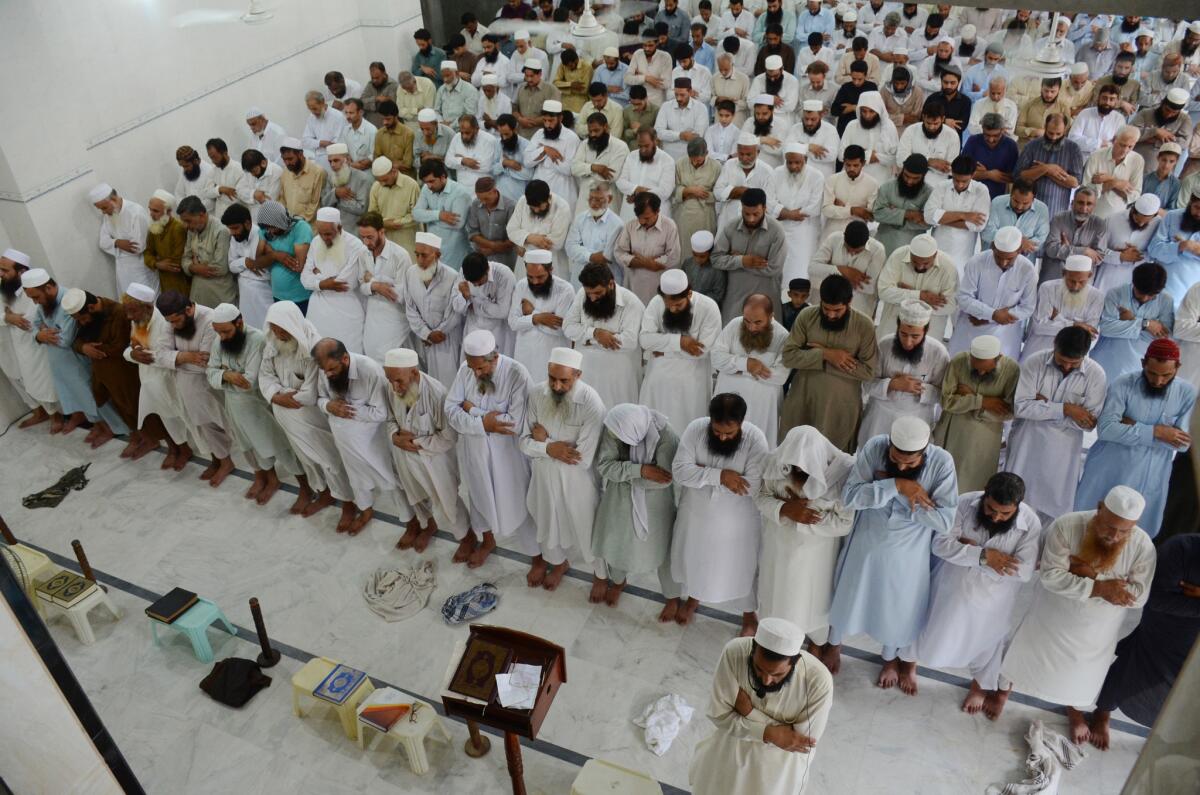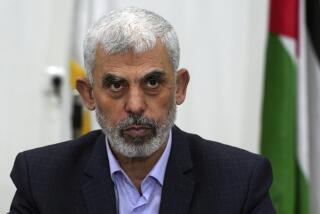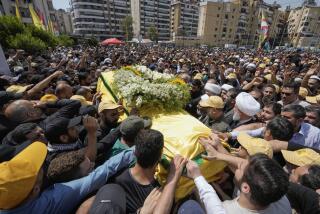Afghan Taliban announces new leader

Worshippers offer funeral prayers for the Taliban’s late leader, Mullah Mohammad Omar, at a mosque in Peshawar, Pakistan, on Friday.
- Share via
reporting from Kabul, Afghanistan — The Taliban on Friday formally announced their new leader, saying he had been running the insurgent group’s operations for years in the absence of former leader Mullah Mohammad Omar.
The new leader, Akhtar Mohammad Mansoor, served as military aviation chief when the Taliban ruled Afghanistan from 1996 to 2001. He was Omar’s deputy and is said to be close to the intelligence establishment in Pakistan, which maintains ties with Taliban leaders based there.
Like his former boss, who was reclusive and mysterious even in death, little is known publicly about Mansoor. He takes over from Omar the formal title of “amir-al-mumineen,” or “leader of the faithful, and is “a reliable and suitable person for shouldering heavy tasks,” the insurgent group said in an online statement.
He was chosen following “a prolonged discussion” by the Taliban’s leadership council, it said.
Mansoor joined the Taliban’s top leadership shortly after the 2010 capture of Abdul Ghani Baradar, one of the four founding members of the group.
Following Baradar’s capture -- reportedly in a joint U.S.-Pakistani intelligence operation in the Pakistani port city of Karachi -- Mansoor was named the group’s official No. 2.
Wahed Mujda, a former official in the foreign ministry of the Taliban government, said that in the wake of Baradar’s capture Mansoor became the de facto leader of the group. He said the selection announced Friday ensures a smooth transfer of leadership, and described Mansoor as a proponent of dialogue to end the Afghan conflict.
“Of course he wanted the foreigners out of Afghanistan, but Mullah Mansoor consistently told Mullah Omar that war was not the solution in Afghanistan,” Mujda said. “He would say, ‘We cannot win through killing.’”
Mansoor was part of a Taliban delegation that attended a meeting in early July with Afghan government representatives in Pakistan -- touted as the first official talks between the two sides since the Taliban insurgency began 14 years ago. According to Mujda, Pakistani officials who were handling the talks were at odds with Mansoor, who insisted that the Taliban’s political office in Qatar take the lead in any negotiations. Pakistan wanted Mansoor to lead the delegation, Mujda said, apparently so it could maintain control over the process.
Due to this conflict, Mujda said, Pakistani officials began spreading word of Omar’s death. But the result ended up being an even more prominent role for Mansoor.
With Omar having not been seen in public in more than a decade -- his last audio message was released in 2007 -- the appointment of Mansoor clarifies the Taliban’s leadership structure, which some analysts say could help the Afghan government and others in dealing with the group.
A second Afghan-Taliban meeting scheduled for Friday was called off, but U.S. officials said they remain optimistic about the chances for future talks.
Dan Feldman, President Obama’s special envoy for Afghanistan and Pakistan, said the week’s developments offer “a moment of opportunity” for both sides.
“We are in a very different position than we have been in years,” Feldman told reporters in Kabul. This could lead to a new framework that can be taken advantage of in the interest of peace.”
The Taliban’s statement did little to shed light on Omar’s death, saying only he fell victim to “the illness he was suffering from.” Afghan officials have said they had “credible information” that Omar died two years ago in Pakistan, while Taliban spokesmen have said he never left Afghanistan.
The group also named two deputies to Mansoor -- Maulvi Haibatullah Akhunzada, who headed the group’s judiciary, and Sirajuddin Haqqani, son of a leader of the Haqqani network, a group that operates in close coordination with the Taliban.
The U.S. government has offered a $5-million reward for information leading to Haqqani’s capture, blaming his group for a series of attacks on U.S. forces in Afghanistan.
Latifi is a special correspondent. Bengali reported from Mumbai, India.
More to Read
Sign up for Essential California
The most important California stories and recommendations in your inbox every morning.
You may occasionally receive promotional content from the Los Angeles Times.











